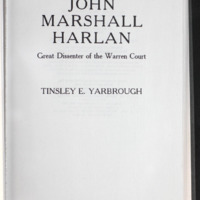-
Title
-
John Marshall Harlan : great dissenter of the Warren Court
-
Description
-
Tinsley Yarborough's biography of Suprem Court Justice, John Marshall Harlan.
-
Identifier
-
539130
-
195060903
-
Creator
-
Yarbrough, Tinsley E
-
Source
-
Brian Lamb Booknotes Collection
-
Gift of Brian Lamb, 2011.
-
Catalog record
-
Language
-
eng
-
Date
-
1992
-
Program air date: April 26, 1992.
-
Publisher
-
Oxford University Press
-
George Mason University. Libraries. Special Collections & Archives
-
Subject
-
"Harlan, John M. (John Marshall), 1899-1971."
-
"United States. Supreme Court."
-
"Judges--United States--Biography."
-
Relation
-
Original Booknotes interview
-
Rights
-
This work may be protected by copyright laws and is provided for educational and research purposes only. Any infringing use may be subject to disciplinary action and/or civil or criminal liability as provided by law. If you believe that you are the rights-holder and object to Mason’s use of this image, please contact speccoll@gmu.edu.
-
Text
-
Transcription of Annotations
Notes on front endpaper: 1. First and Fourteenth Speech; 2. Communists, Pentagon Papers. Underlinings/notes: 34 year tenure on Supreme Court, first John Marshall Harlan--"great dissenter."2nd John Marshall Harlan, sixteen years on supreme bench, Harlan II wrote 613 opinions, more than any other justice of his era. More than grandfather, Harlan believed freedom of expression could be curtailed by consideration of public need, society's interest in national security. Miranda v. Arizona. Warren court imposing constitutionally unwarranted restrictions on the ability of police to maintain order. 2nd Justice Harlan one of the most thoughtful, perceptive jurists on the nation's supreme bench. William Brennan praised Justice's massive scholarship. Shifting restraint bloc. Justice Potter Stewart--what set Harlan apart was character, not scholarship, generous and gallant spirit, selfless courage, freedom from all guile, total decency. Justice Black, a New Deal Democrat, noted that John Harlan showed him that "there is such a thing as a good Republican" After 1963, failing eyesight obliged Harlan to deliver opinions from memory. David Souter. Factual precision. Quakers. John Marshall Harlan I--twice candidate for Kentucky's governorship. William O. Douglas, Stephen Field, John Marshall. John Maynard Harlan, Chicago. John Marshall Harlan II, born 20 May 1899. At eight, sent to preparatory school of Upper Canada College, Toronto. New York's prestigious Lake Placid School. In 1916, entered Princeton. Princetonian--Charles Scribner, paper's president; Harvey Firestone, Jr., secretary treasurer. College friend, Adlai E. Stevenson, Harlan dated his sister, Buffie. Rhodes Scholarship at Oxford University. Herbert Brownell--key role in Harlan's appointment to the federal judiciary. Emory Buckner, U.S. attorney named Harlan to head his office's Prohibition division. Buckner hated the Eighteenth Amendment. Harlan skeptical of national prohibition--thought it ridiculous. Total supportive role played by three adoring sisters, mother and wife. Young Republican Club. Harlan's political activates prior to elevation, were limited. Harlan's international leanings. Atlantic Union Committee; Citizens Association for the United Nations. tension between Black and Frankfurter. Occasionally minor personal clash with colleagues--Chief Justice Warren--Miranda v. Arizona. Harlan dissented--made mention of hope to revisit during next term--was taken to be a slight by Warren who was retiring from the bench. Of Warren Court, mentioned that if it weren't for Justice Black, things would be in worse shape. Harlan not the condescending professor Frankfurter was. Box at National Symphony. Enjoyed bathroom humor, loved practical jokes, gadgets. When Black dined with Harlan's would leave around 11:45 and go around the block so that others could leave and then would return. Black was from Harlan, Alabama. Douglas seemed genuinely close to no colleagues. Harlan lacked political passion. Harlan unusually solicitous of household servants, loaned them money, gave early Christmas gifts when financially strapped. John Twarda, Ethel McCall, messenger Paul Burke. Charles Fried. Phil Heymann, Leon Fuller. Assumption that Douglass was brilliant, but irresponsible, Black brilliant, but didn't make sense--Learned Hand called Black, Douglas, Warren, Brennan--Jesus Quartet. 1962 son-in-law having difficulties building law practice, friend of Harlan's Leo Gottlieb used Harlan's name to try to get firms to send work to son-in-law. Believed that political processes, principles of federalism, separation of powers--more significant safeguards of individual liberty than specific constitutional guarantees. Hugo Black, William O. Douglas, William Brennan, Earl Warren, Felix Frankfurter, Tom Clark, Potter Stewart, Charles Whittaker. Philosopher Sidney Hook. Libel and Free Speech--New York Times v. Sullivan. Religion clauses--Alphonso Taft--charges that he was Unitarian, crippled his candidacy. Like his grandfather, Harlan II feared the political friction generated from mixture of secular/religious. Two of Harlan's clerks went on to clerk for the Court of Appeals for the District of Columbia when Burger sat on that bench--wanted to have Harlan think badly of Burger--Harlan thought Burger ran fairer conference than Earl Warren. Paul Brest--NAACP in Mississippi. Michael Boudin--little given to pronouncements...or talking, an amazingly tolerant listener. When went blind, once greeted a tree. Asked Black's son when Black would retire so as not to detract from the event with his own. 14 Sept. 1971, Black retired and suggested that the blind Harlan do the same. Harlan believed that an individual judge's commitment to self-restraint rather than the ambiguities of constitutional text/history was the most effective safeguard against abuse of judicial power. Prosecutorial experience, work with Emory Buckner's Prohibition enforcement team, chief counsel to the New York crime commission. Death threats during time with crime commission may have impacted his thinking. Wartime activates, disdain for Soviets, may have contributed to reluctance as a Justice to second-guess judgments of government officials regarding national security. Rhodes Scholar, Balliol College--Harlan's opinions adopted British spellings--appreciation for legal traditions. Harlan's father--financial problems. Impeccable social credentials, Princeton classmates. Du Pont brothers. Felix Frankfurter--radical point of view. Norman Dorsen. National security, true conservative, not right-winger--keep things on an even keel. Justice Frankfurter fed him negative information and gossip about Hugo Black. Black/Harlan concerned about judicial abuse. Crying need for major study of Cout's clerks and their roles. Raymond Massey, Rumer Godden, Cornelia Otis Skinner--friends. Patrician, but not snob. Said would have no difficulty with a homosexual clerk. Like grandfather, often wrote in dissent.
 539130.pdf
539130.pdf